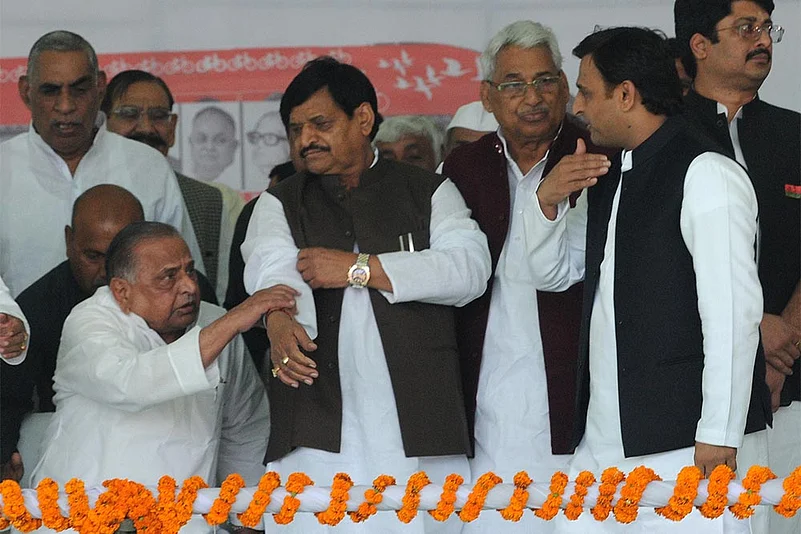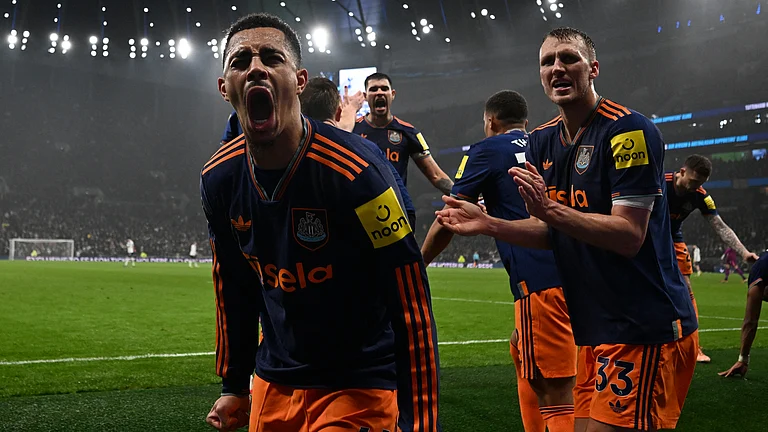Until six months ago, the Samajwadi Party (SP) was a major force in Uttar Pradesh with Chief Minister Akhilesh Yadav trying to focus on development while signing on dotted lines set by father Mulayam Singh. It was, in fact, the 76-year-old Mulayam who did all the backseat-driving, after having carefully placed his trusted aides in high positions in the system of governance to ensure “smooth” functioning. Akhilesh never asserted himself or mustered the courage to stand up to his father and so the young CM often ended up being ignored when it came to decision-making in the party and even in the government.
Queering the pitch for Akhilesh is the return of the flamboyant ‘native’ to the party six years after being expelled—Amar Singh, who once earned the epithet of “de facto chief minister” in de jure CM Mulayam’s government and still carries the reputation of a wheeler-dealer, networker and shrewd political go-between. During what’s turned out in retrospect to be an extended, enforced sabbatical from active politics, Amar plotted his way back to the party pulling all strings. He managed to convince Mulayam’s brother Shivpal and, eventually, Mulayam put Amar Singh, the man with the right connections among the rich and famous, before his family. This May, Amar Singh was back in the SP, and soon, the swords were out in the party’s ‘first family’.
Already simmering over the dominance of Anita Singh, principal secretary of the state and a close associate of Mulayam, Akhilesh decided to flex his muscle. In June, he sacked minister Balram Yadav, one of the founding members of the party, for brokering a merger with don Mukhtar Abbas Ansari’s Qaumi Ekta Dal. Come September, he had removed controversial chief secretary Deepak Singhal, who apparently had Shivpal’s blessings, within two months of his joining. Middle of that month, Mulayam made Shivpal the party president, replacing Akhilesh. Soon Akhilesh divested Shivpal of all cabinet portfolios.
There is speculation that Amar Singh is trying to resurrect his political ambition by building a bridge between Mulayam and Prime Minister Narendra Modi. In May, when BJP president Amit Shah sounded the election bugle for the assembly polls in the state, scheduled in the first quarter of 2017, he called the SP its main rival. Today, the rival party stands divided, although a split is highly unlikely before the elections, if at all. Interestingly, the SP also calls the right-wing party its main opponent.
After the SP, if there is another political force to reckon with in UP, it is the Bahujan Samaj Party (BSP). So are the SP and the BJP working in tandem for long-term political benefits? “It would be wrong to think our party’s election strategy is based on developments in the Samajwadi Party,” the BJP’s UP in-charge Om Prakash Mathur tells Outlook. “The party is moving exactly how it had planned to move many months ago, beginning with a membership drive and five yatras in four districts scheduled from November 5. The membership figures have gone up to two crore in this state itself.” Another BJP in-charge in the state, Rameshwar Prasad Chaurasia, says, “We have nothing to do with the family conflict in the SP; the fight among them is over sharing of booty.”
Insiders, though, have a completely different take. The “family feud”, which has, of course, been blown out of proportion, has really helped in establishing Akhilesh as the party’s emerging leader and the entire focus has turned towards the SP.
Many in the state feel that the BJP and the SP are moving as per a mutually agreed script. If the SP and the BJP project each other as main rivals, the BSP gets shunted out of the limelight.
Both the BSP and the SP have had a strong voter base among Dalits, Yadavs and Muslims, who comprise nearly 40 per cent of the state’s population. The Muslims alone, as per Census 2011, make up 19.26 per cent. The proverbial “Muslim votebank”, which has been largely loyal to the SP so far is watching the drama in the party’s “first family”, keeping the cards close to the chest. In such circumstances, a strong anti-BJP stance is only likely to help the SP keep its Muslim voter base intact, despite the BSP trying to poach it. Similarly, a loud and clear anti-Samajwadi stance that favours the Muslims would only help the BJP further consolidate the upper-caste and non-Yadav vote base.
The BJP undoubtedly benefited from the nationalism factor, buoyed by the ‘surgical strike inside Pakistan’, but as those gains may not last, the party is also trying to focus on the social equations in UP’s caste-dominated politics. With the Muslim votes ruled out, upping the scale of winnability would take some tinkering with the caste permutations, an insider let on. Besides a section of Thakurs, the party is targeting Brahmins, Baniyas, Kayasthas, Lodhas, Kurmis, Sainis, Khateeks, Dhanuks and Kolis, among others.
Among UP’s Hindus (79.73 per cent of the population as per the Census), OBC Hindus comprise the largest chunk, dominated by Yadavs, the traditional vote base of the SP. The BJP is eyeing these votes too. The BJP is trying to muster up all other communities, including the eight per cent votes of Yadavs and Jats, who have their reasons to be disappointed with the BJP.
According to political commentator Shiv Visvanathan, to watch the SP, the BSP and the BJP in the fray is like watching a “floating musical-chair competition with three different kinds of music” and each one trying to create an electoral calculation on whether they can create a Muslim coalition, anti-Muslim coalition, caste coalition, anti-caste coalition. “This brings out the worst of electoral politics, not democratic politics,” he says. “The separation of the two is worrisome; there is too much internal politics, inner struggle and so on.”
In fact, the SP and the BJP are perhaps complementing each other, says Visvanathan: “It is like a case of opposition in mutuality; on the one hand, they are trying to trip the other and, on the other hand, they are holding the other so the other doesn’t trip. Somewhere down the line, their themes are not sounding thematic; they are like broken songs on each side. There is no epic quality. Is it an election of fixers, brokers, party breakers, ideological rhetoric? It doesn’t make sense. It has muddied the elections with so many waters. With Amar Singh around, one really needs a Swachh Abhiyan in elections.”
The Congress and the SP are interested in a Bihar-like mahagatbandhan (grand alliance) as neither wants the Muslim votes to get divided. If Muslim votes are necessary for the revival of the Congress in the state, they are equally important for the SP’s survival. According to media reports, Congress election strategist Prashant Kishor met Mulayam along with Amar Singh in Delhi. According to sources close to the SP, a mahagatbandhan would send out a nationwide message to Muslims that the battle against the BJP has not been lost yet.
The morale of Congress workers is already low as the party won only 28, 22 and 25 seats in the 2012, 2007 and 2002 assembly elections, respectively. Observers feel the Congress is in a shambles in UP and, being a stranger to power since the past 27 years, it cannot afford to be too choosy. A senior Congress leader admits that no matter how the “crisis” in the SP pans out, the Congress will have to make tactical moves that best suit the situation. Prior to Kishor meeting Mulayam, UP Congress unit chief Raj Babbar explained to Outlook, “Options are wide open before us. We are minutely watching the developments in UP and exploring all options.”


























